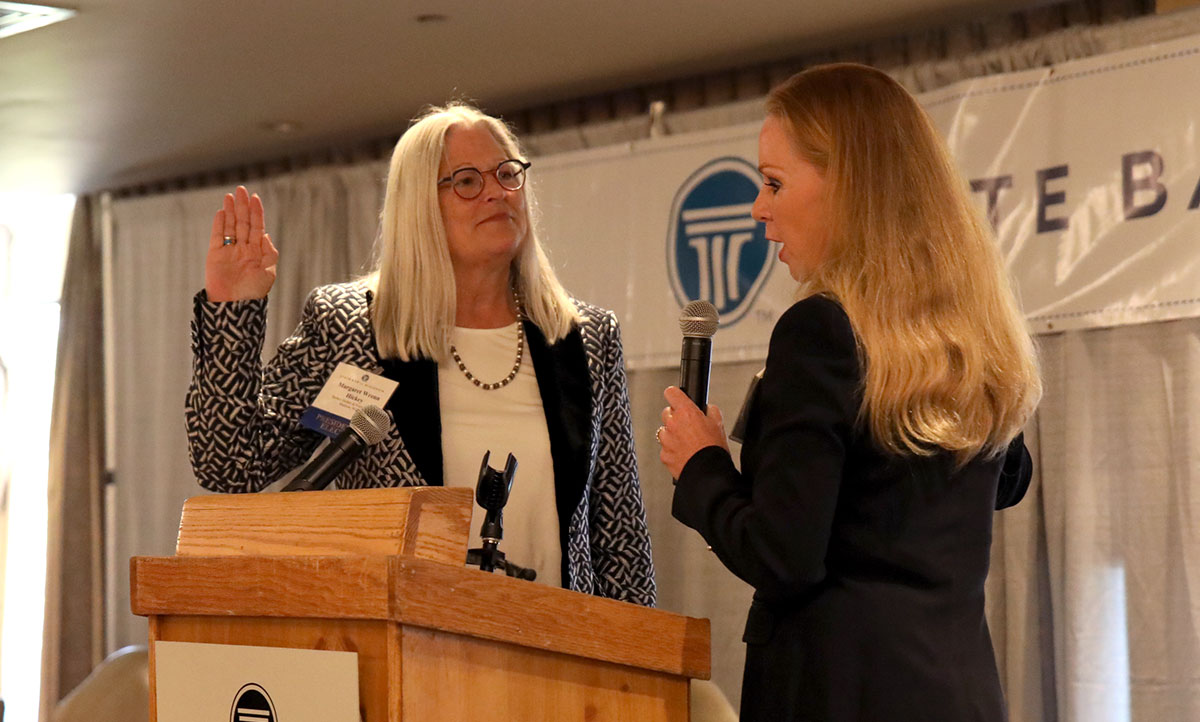
Wisconsin Supreme Court Chief Justice Annette Ziegler (right) administers the oath of office to Margaret Hickey, incoming president of the State Bar of Wisconsin. Hickey's term starts July 1.
June 15, 2022 – For Margaret Hickey, who’s spent her legal career practicing family and elder law, service to the profession has been a passion.
Hickey has chaired the Elder Law (1998-99) and the Family Law (2002-03) sections and the Board of Governors (2006-07), as well as serving a State Bar treasurer (2009-11).
Hickey will cap that record of service by governing the State Bar of Wisconsin for FY 2023. She was sworn in last night as the State Bar’s 67th president.
Wisconsin Supreme Court Chief Justice Annette Ziegler gave remarks before administering the oath of office. Hickey’s brother, Attorney Peter J. Hickey, emceed the event. Hickey’s law partner, Heather Poster, and Kelly Centofani, a colleague of Hickey’s, also spoke.
Hickey, the fourth consecutive woman to be elected president, will begin her term on July 1. For the last year, Hickey has served in the role of president-elect.
As of that date, women will for the second consecutive year hold all of the State Bar’s elected officer positions. Outgoing State Bar President Cheryl Furstace Daniels will serve as immediate past president, and the incoming board chair and secretary and treasury and past president are all women.
At the same time, six of the Wisconsin Supreme Court’s seven seats are occupied by women – a greater percentage of women high court justices than any other state in the nation.
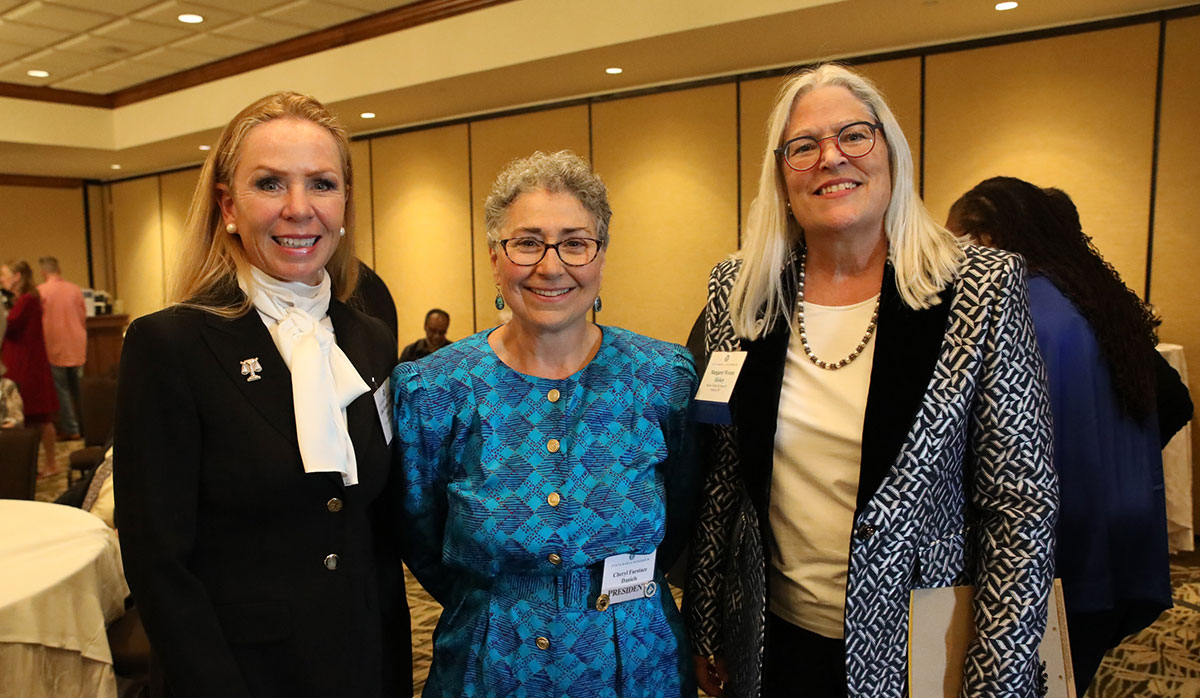
From left, Chief Justice Annette Ziegler with outgoing State Bar President Cheryl Daniels and incoming president Margaret Hickey.
‘That Trend Will Continue’
In her remarks, Chief Justice Ziegler thanked Daniels for her service. “You’ve been a great ally to the court system … and I appreciate you as a person and a friend,” Ziegler said.
Chief Justice Ziegler pointed out that the judiciary has faced significant challenges posed by the pandemic, “and I think the bar has been a great ally.”
“We’ve been in great hands with you Cheryl, and that trend will continue with President Hickey.”
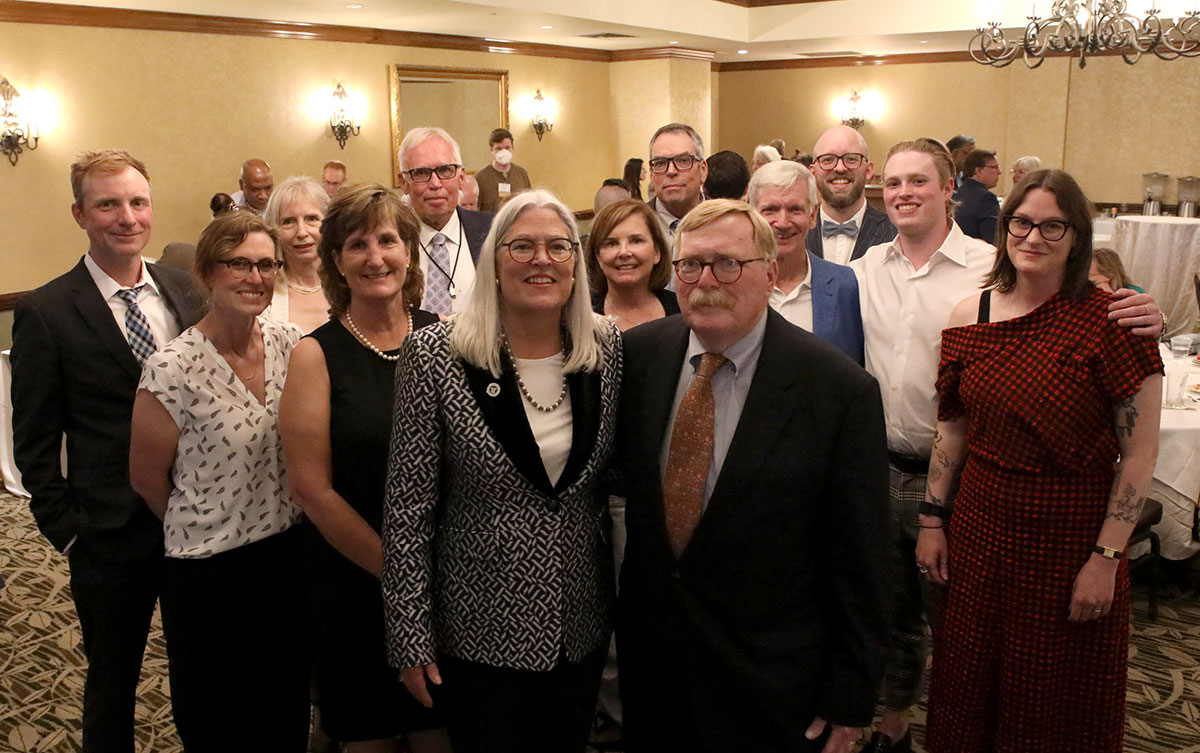
Margaret Hickey's family was in attendance for her swearing-in ceremony.
‘A Change Gonna Come’
After thanking Daniels for her service, Hickey, the managing shareholder at Becker, Hickey & Poster, S.C. in Milwaukee, gave remarks titled “A Change is Gonna Come.” She took the title from a 1964 song written by soul artist Sam Cooke after he was refused service at a whites-only hotel in Louisiana.
In the speech, Hickey, a 1982 graduate of Marquette University Law School, said the State Bar’s members could make meaningful changes in three areas.
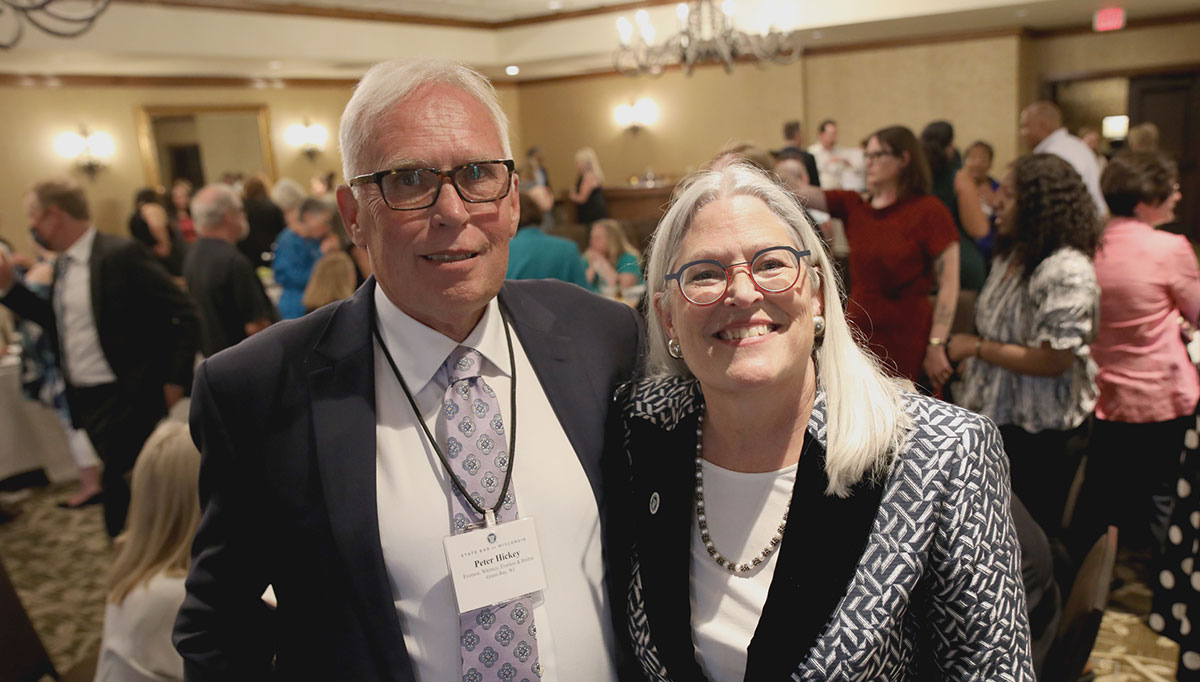
Margaret Hickey with her older brother, attorney Peter Hickey, who emceed the event.
Promote Diversity or ‘Stagnate’
The first area was diversity, inclusion, equity, and access.
 Jeff M. Brown is a legal writer for the State Bar of Wisconsin, Madison. He can be reached by email or by phone at (608) 250-6126.
Jeff M. Brown is a legal writer for the State Bar of Wisconsin, Madison. He can be reached by email or by phone at (608) 250-6126.
Hickey pointed out that the ethical obligation to practice competently “includes understanding the people we are serving, the courts we appear before, and the lawyers with whom we work.
“The people we serve are changing in terms of their diversity and backgrounds and so must we,” Hickey said. “The legal profession needs to diversify our ranks. The attorneys who practice should reflect society as a whole.”
We cannot change our respective backgrounds, Hickey said. But each of us can learn about people from other backgrounds and practice cultural competence.
“We can support the careers of lawyers who come from different backgrounds, races, different abilities and bring a different perspective to legal work.
“This means hiring, mentoring, promoting and giving real opportunity to diverse attorneys. This may mean stepping aside and allowing others to take the spotlight.”
Hickey said unless lawyers promote diversity, the profession will “stagnate.”
“Others can replace us who have more cultural competence or insight into the people we are serving. There may be a fear of competition but in fact there is plenty of work for all of us, and we are a better profession if our members reflect those we serve.”
Hickey said the bar should implement the recommendations made by the State Bar’s Racial Justice Task Force “and continue to work for a more just system for all.”
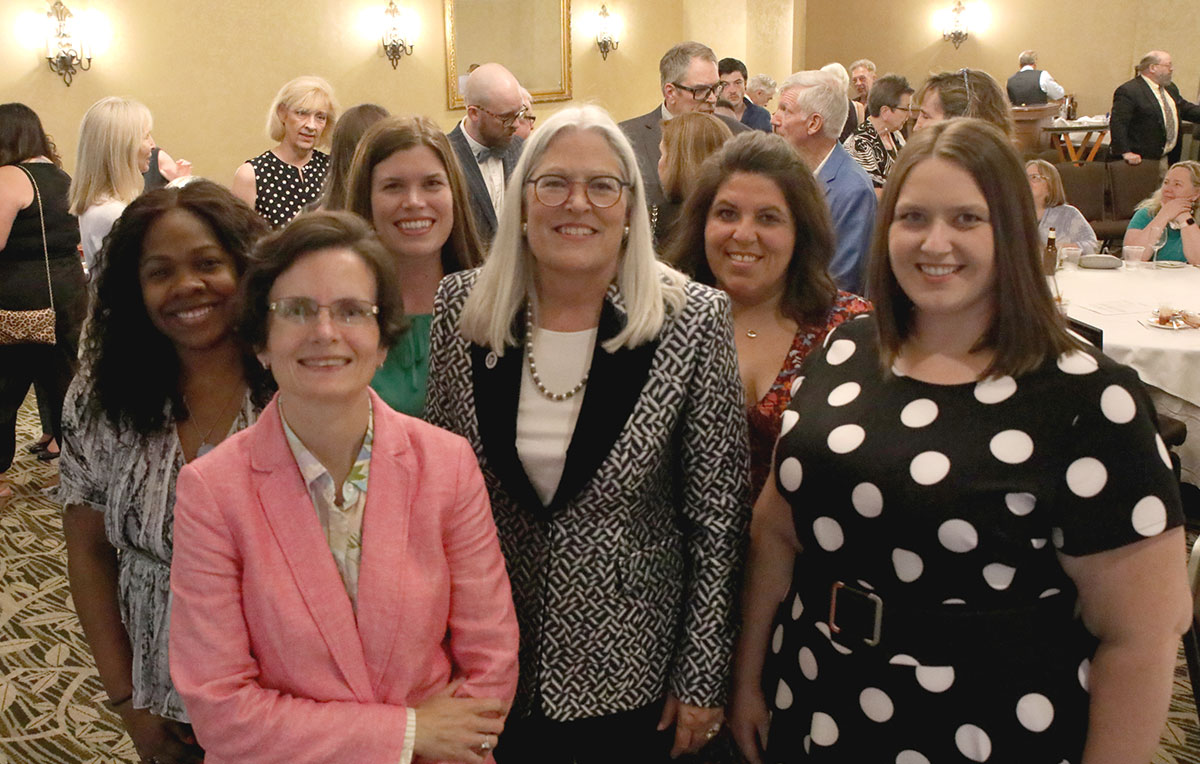
Attorneys and professional support staff from Margaret Hickey's Milwaukee law firm, Becker, Hickey & Poster S.C., attended the swearing-in ceremony. Her partner, Heather Poster (front), spoke at the event.
Talk Up Greater Wisconsin
Access to justice issues in rural parts of the state was the second area for change highlighted by Hickey.
To address the problem, Hickey said, the State Bar must promote among new lawyers knowledge of the opportunities for better work/life balance offered by jobs in the rural parts of the state.
“That means that as a State Bar, we need to figure out how to encourage the law schools to educate our law students about the opportunities available in greater Wisconsin.”
In turn, Hickey said, State Bar members must then be willing to support young lawyers practicing in greater Wisconsin, where mentors will be in lesser supply.
“That means taking a phone call to answer questions from someone you don’t know who is handling a case for the first time and needs guidance,” Hickey said.
“That means sharing your materials, your outlines, your forms, and your time with people who are willing to venture a practice in these out-state areas. That means building support networks online as well as in person.”
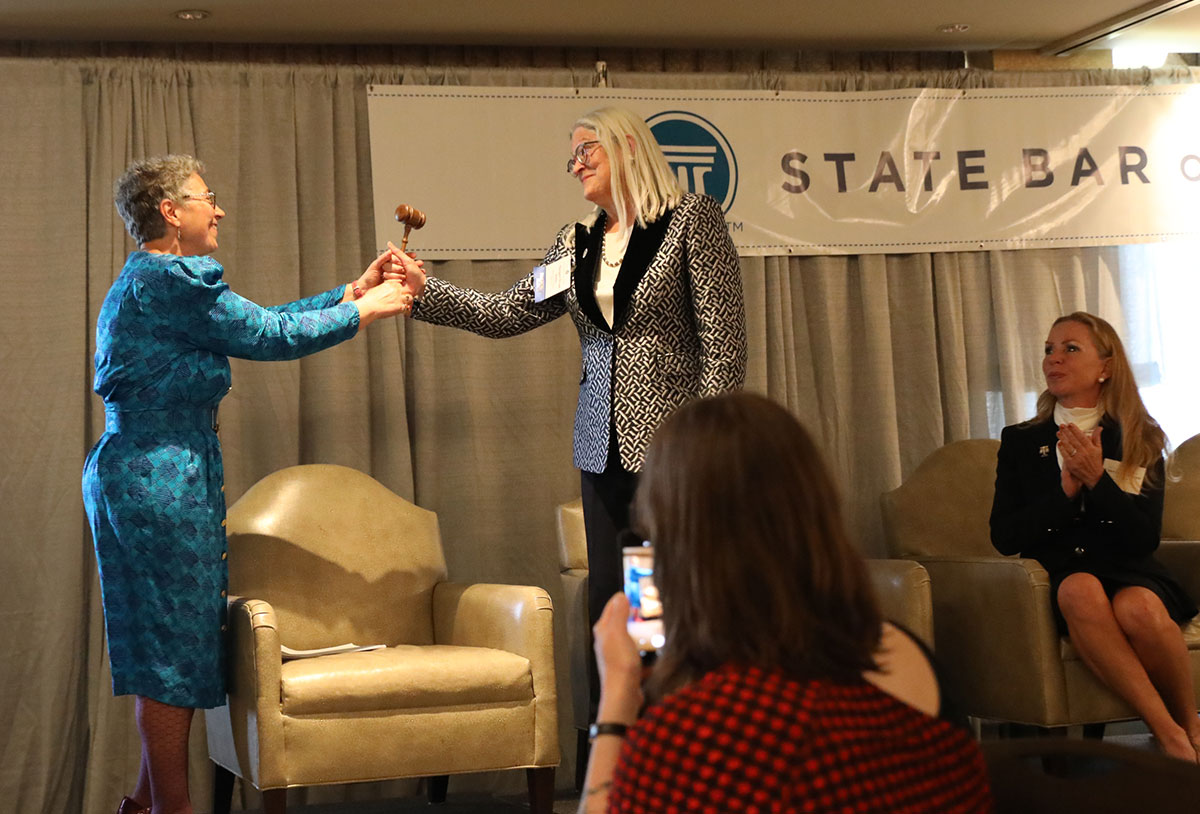
Margaret Hickey recieved the gavel in the traditional pass-the-gavel ceremony among former State Bar presidents.
Individual Efforts Key to Improving Well-being
The third area of change Hickey discussed was lawyer well-being.
She cited the following statistics from a lawyer study recently released by the American Bar Association:
28% suffered from depression;
19% experienced severe anxiety;
11.4% had suicidal thoughts in the past year.
A December 2021 report by the Task Force on Wisconsin Lawyer Well-Being contains 72 recommendations for improving lawyer well-being. But it’s beyond the State Bar’s capacity to implement many of the recommendations, Hickey said.
“Instead, each of us must take responsibility for wellness in our own lives, in the law firms or organizations in which we work to implement changes that will improve lawyer wellness. Otherwise, burnout, addiction, and other problems will end the careers of too many attorneys.”
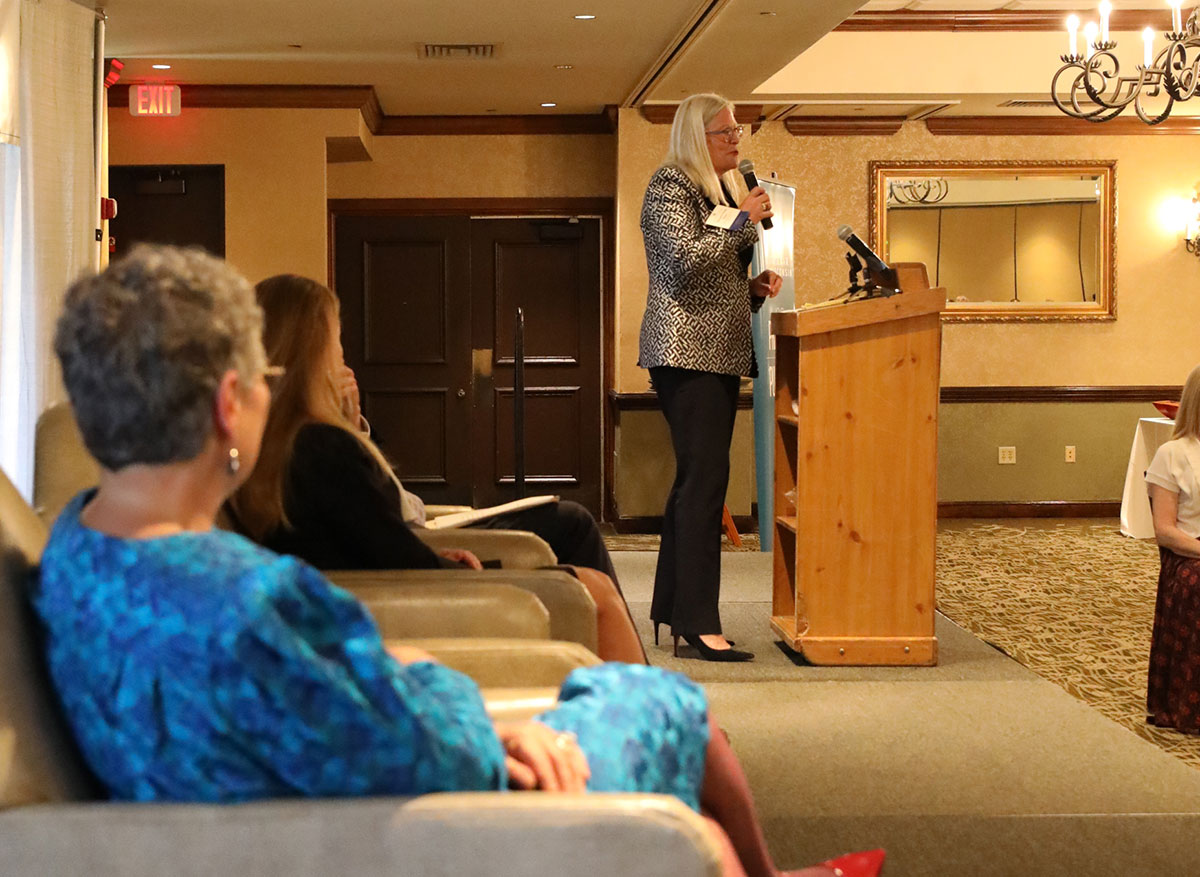
In her speech, Margaret Hickey talked about the power of change and her plans for the upcoming year.
‘Full Circle’
As she closed her speech, Hickey talked about the importance of volunteering.
Hickey, who has served on the boards of the Legal Aid Society of Milwaukee and the Milwaukee Bar Association and as president of the Wisconsin Equal Justice Fund, said lawyers have an ethical obligation to give back to the profession.
Hickey said that a recent stint volunteering at an expungement clinic in Kenosha – which she was able to do after only a few hours of training – was “rewarding and eye-opening.”
“I ask you as part of this year while I am President of the State Bar to give of your time,” Hickey said. “It can be a small or large project; you can give hours or days … what is critical is that you do something. I assure you that whatever your interest, we have a committee, initiative, or task force at the State Bar that you can work on. Or we can direct you to another legal entity to volunteer.”
Hickey said she’s experienced the positive power of volunteering in a more personal way.
When Hickey’s maternal grandmother became pregnant with Hickey’s mother in 1927, she was unmarried. It was era when out-of-wedlock pregnancies were a source of shame, so Hickey’s grandmother turned to Rosalie Manor, a community agency for unwed mothers – and one Hickey volunteered at as a young lawyer decades later.
“I found out that the nuns who ran Rosalie Manor actually cared for my mother early in her life,” Hickey said. “Sometimes the volunteer work that we do brings us full circle,” Hickey said.
Hickey said that volunteering is one way for lawyers to ensure that active, rather than passive, change drives advances in diversity and inclusion, lawyer well-being, and access to justice.
“I am calling on each of you to act in a positive way to change our profession.”
